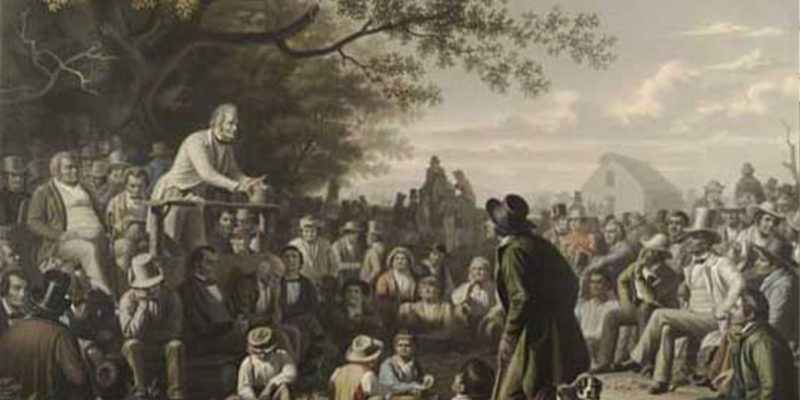This article assesses the gulf between Tocqueville’s claim that human beings have naturally transcendent souls and his observations of the democratic souls of Americans.
Tocqueville holds that humans are unique in their connection to God, and touches on this theme throughout Democracy in America. In Jacksonian America, as perhaps in any time and in any place, Tocqueville was confronted by the juxtaposition of man’s incredible power with his astonishing weakness. Tocqueville declares that “Man did not give himself the taste for the infinite and the love of what is immortal. These sublime instincts are not born of a caprice of his will; they have their immovable foundation in his nature; they exist despite his efforts” (DA, 510). He seems to conclude that there is something deeply and innately religious about humanity itself—that the human soul is transcendent in some way. This is a much stronger claim than simply saying that people are attracted to ideas that ameliorate the confusion and suffering of life. Yet Tocqueville’s assertions regarding the transcendence of the soul are incommensurate with his account of the description of the American mind.
The first challenge to Tocqueville’s conception of the transcendence of soul comes with the doctrine of self-interest, which is utterly pervasive in American life. According to this principle, virtue is good only insofar as it is profitable to the one exercising it (DA, 500-501). Tocqueville writes that the American “sees in the public fortune his own, and he works for the good of the state not only out of duty or out of pride, but I would almost dare say out of cupidity” (DA, 226). This contrasts starkly with the impetus for action that one would expect from a being whose very soul was religious or transcendent in nature. It is worth noting here that when Tocqueville makes the claim that man yearns for the immortal, he is addressing much more than the instinctual drive for survival. One could claim, as has often been done, that religiosity is, at bottom, a natural response to the fear of death. However, Tocqueville believes that man wants more than a perpetual existence as an embodied creature on Earth; he wants to approach the divine. The doctrine of self-interest well understood is not necessarily in conflict with the first conception of man’s drive toward immortality, but it does significantly weaken the claim that he wants to achieve holiness.
The demise of virtue as such is further elaborated when Tocqueville presents rights as virtue introduced into the political world. It quickly becomes apparent that his description of democratic rights does not amount to virtue in the traditional, religious sense. “Do you not perceive on all sides beliefs that give way to reasoning, and sentiments that give way to calculations?” Tocqueville continues: “If in the midst of that universal disturbance you do not come to bind the idea of rights to the personal interest that offers itself as the only immobile point in the human heart, what will then remain to you to govern the world, except fear?” (DA, 228). In this account, rights are a baser replacement for virtue; the very essence of virtue is lost as personal interest becomes the primary motive.
Further, the claim that personal interest is the “only immobile point in the human heart” is telling. How this is to be reconciled with the aforementioned claims regarding the nature of the human soul is not clear. Either personal interest is analogous to, or inheres in, the divine spirit that Tocqueville earlier claims to be the single immobile point in man’s soul, or there is a contradiction in his presentation of human psychology. The former cannot be true because one of the fundamental elements of religiosity is self-sacrifice. Thus, there are two candidates for Tocqueville’s basis of human nature: the religious one that he posits and the self-interested one that he observes. The American modus operandi observed by Tocqueville sheds light on which is true, but an assessment of a few other elements of American thought and religiosity will serve to make the situation clearer, beginning with the influence that the doctrine of self-interest exerts on religion itself.
Tocqueville holds that, rather than undermining its influence, the doctrine of self-interest well understood makes religious belief more likely (DA, 505), and he attempts to bring into harmony the psychological impulses underlying the pursuit of one’s interests and those demanded by religion. As most people know very well, reason and custom lead individuals to make sacrifices in the present so that they can reap greater benefits in the future. Religion, Tocqueville argues, merely extends this reasoning by requiring sacrifices that can be cashed in not at some future date in time, but at after death when an individual is at the boundary of eternity. Important to understanding this capability of human beings is the fact that one does it not out of instinctual drive, but often against instinct and at the behest of reason. This is, after all, what separates us from other animals, many of which also make sacrifices for the future, but never out of anything besides pure biological imperative.
It is unclear whether the reasoning that is at the foundation of religious belief strengthens or weakens Tocqueville’s claim about human’s religious nature. It could certainly be argued that the decision to believe is more respectable and meaningful than it would be to follow instinct. After all, the argument goes, God gave us free will for a reason and choice is necessary to distinguish meaningfully between those who will be saved and those who will not. Yet this elides the reasoning behind such a decision, about which Tocqueville conjectures when he writes that American preachers often focus on terrestrial matters and that “it is often difficult to know when listening to them if the principal object of religion is to procure eternal felicity in the other world or well-being in this one” (DA, 505-6). It seems that, at bottom, the affirmation of religious belief is not different in kind than the decision to postpone gratification in the present for the sake of the finite future. Rather, it is a choice—“so tranquil, so methodical, so calculated”—that simply expands the bodily, self-oriented concerns that one feels on earth, to the afterlife. Thus, Tocqueville’s reconciliation of religion with self-interest, rather than exalting self-interest, pulls religious belief down to the level of commonplace interests.
If it were the case that there existed an immutable religious component to man’s nature, one would expect some degree of loftiness to his thoughts and aspirations, his own human Fallen-ness notwithstanding. Yet, this is positively the opposite of what Tocqueville observes in the Americans. Between descriptions of their intellectual habits, artistic pursuits, and material obsession, one comes to see a conception of humans that is inescapably un-religious.
At the outset of the second volume, in order to undergird his discussion on the intellectual effects of democracy, he describes the “philosophic method” of the Americans. The equality of their social state causes Americans to turn away from authority or inherited opinion and, instead, they consider themselves the sole arbiters of truth (DA, 403). When Americans do inevitably have to defer to some authority, due to the impossibility of strict independence, they will not normally seek out religious guidance. Tocqueville writes: “One can foresee that democratic peoples will not readily believe in divine missions, that they will willingly laugh at new prophets, and that they will want to find the principal arbiter of their beliefs within the limits of humanity, not beyond it” (DA, 408). To the degree that they preserve religious ideas, they do so not as a result of reflective wisdom, but out of an automatic adoption of tradition “without examination.” If fundamental religiosity reflects human nature, then one would expect something approximating a free, enlightened arrival at religious belief, not the unreflective acceptance exhibited by the Americans.
The worldly, materialistic nature of the American mind manifests itself in various ways during the course of Democracy in America, but two stand out: American poetry and the obsession with material-well being. Poetry, as an artistic medium, can lend itself to discussion of the divine and sublime, which makes it an interesting point of reference while assessing the nature of a people. In Tocqueville’s words: “Poetry in my eyes is the search for and depiction of the ideal” (DA, 458). In an aristocracy, religiosity and division of classes provide rich material for poetry, because both lead poets to imaginative speculation, either of God or of the other. On the contrary, in a democracy, the tepid earthliness of religious belief and the uniformity of people preclude traditional poetic inspiration. Instead, democratic poets must focus on the general form of the people and the boundless future that they see before them (DA, 460). Despite its anthropocentrism, Tocqueville sees in this bird’s eye view of humanity a sort of divine perspective. He writes, “At the same time that each one, by raising his eyes above his country, finally begins to perceive humanity itself, God manifests himself more and more to the human spirit in his full and entire majesty” (DA, 461). But the poetic inspiration that he describes here is rooted in fascination with, and adoration of, humanity itself. It “turns the imagination away from all that is external to man to fix it only on man” (DA, 460). It is not so much a pensive, self-reflective impulse as a worshipping of the collective power of man. Moreover, it is a specific form of power that intrigues the Americans: a material power that they wield over nature and each other. “The American people sees itself advance across the wilderness, draining swamps, straightening rivers, peopling the solitude, and subduing nature” (DA, 461).
Relatedly, Tocqueville describes the Americans’ pursuit of material well-being, which roots them firmly to the earth and is difficult to reconcile with mankind’s proposed innate religiosity. Love of material well-being would not be so destructive to Tocqueville’s notion of a transcendent human nature were it not so totalizing. We are human beings, after all, and the desire for carnal pleasure is an unavoidable part of our humanity. In the case of the Americans, however, it becomes a consuming impulse that can blind them other aspects of life. “These objects [to which it is directed] are small, but the soul clings to them: it considers them every day and from very close; in the end they hide the rest of the world from it, and they sometimes come to place themselves between it and God” (DA, 507).
Tocqueville greatly worries that this tendency will combine with a philosophical materialism that would leave the impulse utterly unhinged. In what follows, he gives a pragmatic account of religion that aims more at psychological soothing than deep spiritual alignment. He writes, “Most religions are only general, simple, and practical means of teaching men the immortality of the soul. That is the greatest advantage that a democratic people derives from beliefs, and it is what renders them more necessary to such a people than to all others” (DA, 519). Admittedly, religiosity does not necessitate earthly perfection, but Tocqueville’s concern that man may fall into the “fatal circle”—love of material well-being catalyzed by philosophical materialism—belies the religious, transcendental nature of man, which ought to inoculate him from such a deadly spiral.
Tocqueville’s idea of the innate religiosity of man becomes untenable upon analysis of the American mind and action. The worship of self-interest, the unrestrained pursuit of material well-being, and the exaltation of humanity all serve to show that humans are bound tightly to the earth and struggle greatly to resist limiting themselves to worldly ideas. It is quite possible that Tocqueville noted a human need for dogma and mistakenly ascribed it to a basic religious essence – or he thought it best to ascribe it to a transcendent nature. His recognition of the dogmatic impulse nevertheless raises very interesting questions about democracy in an increasingly secular age and provides yet another example of why Tocqueville remains relevant today.
WORKS CITED
Tocqueville, Alexis de. 2000. Democracy in America. Translated by Harvey C. Mansfield & Delba Winthrop. Chicago: The University of Chicago Press.




 Compass is an online journal that provides a space for the work of talented undergraduates who have original and well-articulated insights on important ideas and issues relating to American democracy understood in the broad contexts of political philosophy, history, literature, economics, and culture.
Compass is an online journal that provides a space for the work of talented undergraduates who have original and well-articulated insights on important ideas and issues relating to American democracy understood in the broad contexts of political philosophy, history, literature, economics, and culture.